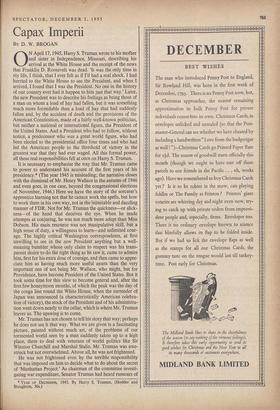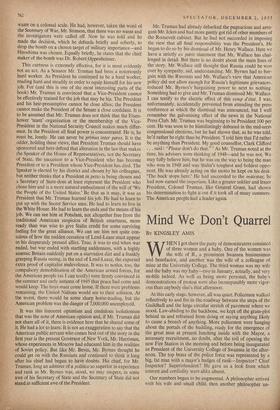Capax Imperil
By D. W. BROGAN • 0 N April 17,1945, Harry S. Truman wrote to his mother and sister in Independence, Missouri, describing his arrival at the White House and the receipt of the news that Franklin D. Roosevelt was dead. 'It was the only time in my life, I think, that I ever felt as if I'd had a real shock. I had hurried to the White House to see the President, and when I arrived, I found that I was the President. No one in the history of our country ever had it happen to him just that way.' Later, the new President was to describe his feelings as being those of a man on whom a load of hay had fallen, but it was something much more formidable than a load of hay that had suddenly fallen and, by the accident of death and the provisions of the American Constitution, made of a fairly well-known politician, but neither a national or international figure, the President of the United States. And a President who had to follow, without notice, a predecessor who was a great world figure, who had been elected to the presidential office four times and who had led the American people to the threshold of victory in the greatest war that they had ever waged. All this formal power, all these real responsibilities fell at once on Harry S. Truman.
It is necessary to emphasise the way that Mr. Truman came to power to understand his account of the first years of his presidency.* (The year 1945 is misleading; the narrative closes with the dismissal of Mr. Henry Wallace in the autumn of 1946 and even goes, in one case, beyond the congressional elections of November, 1946.) Here we have the story of the sorcerer's apprentice learning not that he cannot work the spells, but how to work them in his own way, not in the inimitable and dazzling manner of FDR. Not for Mr. Truman the quickness—or slick- ness—of the hand that deceives the eye. When he made attempts at conjuring, he was not much more adept than Miss Dobson. His main resource was not manipulative skill, but a high sense of duty, a willingness to learn—and unlimited cour- age. The highly critical Washington correspondents, at first unwilling to see in the new President anything but a well- meaning bumbler,whose only claim to respect was his trans- parent desire to do the right thing as he saw it, came to admire him, first for his extra dose of courage, and then came to appre- ciate him as having much more useful assets than the very important one of not being Mr. Wallace, who might, but for Providence, have become President of the United States. But it took some time for this view to become general and, after the first few honeymoon months, of which the peak was the day of the conga line round the White House, when the surrender of Japan was announced (a characteristically American celebra- tion of victory), the stock of the President and of his administra- tion went down nearly to the cellar, which is where Mr. Truman leaves us. The upswing is to come.
Mr. Truman has not chosen to tell his story that way; perhaps he does not see it that way. What we are given is a fascinating picture, painted without much art, of the problems of our tormented world seen by a man suddenly taken up to a high place, there to deal with veterans of world politics like Sir Winston Churchill and Marshal Stalin. Mr. Truman was awe- struck but not overwhelmed. Above all, he was not frightened.
He was not frightened even by the terrible responsibility that was imposed on him to decide what to do about the secret of 'Manhattan Project.' As chairman of the committee investi- gating war expenditure, Senator Truman had heard rumours of * YEAR OF DECISIONS, 1945. By Harry S. Truman. (Hoddcr and Stoughton, 30s.) waste on a colossal scale. He had, however, taken the word of the Secretary of War, Mr. Stimson, that there was no waste and the investigators were called off. Now he was told and he made the decision, which he defends briefly and soberly, to drop the bomb on a chosen target of military importance—and Hiroshima was chosen. Equally briefly, he states that the Chief maker of the bomb was Dr. Robert Oppenheimer.
This curtness is extremely effective, for it is most evidently not an act. As a Senator Mr. Truman had been a notoriously hard worker. As President he continued to be a hard worker, reading hard and steadily in order to equip himself for his new job. For (and this is one of the most interesting parts of the book) Mr. Truman is convinced that a Vice-President cannot be effectively trained for the job that may be his. The President and his heir-presumptive cannot be close allies; the President cannot make the President of the Senate a close confidant. It is to be assumed that Mr. Truman does not think that the Eisen- hower 'team' .organisation or the membership of the Vice- President in the National Security Council makes much differ- ence. In the President all final power is concentrated. He is, he must be, lonely. He can never be prInzus inter pares. It is the odder, holding these views, that President Truman should have sponsored and here defend that alteration in the law that makes the Speaker of the House of Representatives, not the Secretary of State, the successor to a Vice-President who has become President or to a President whose Vice-President has died. The Speaker is elected by his district and chosen by his colleagues, but neither thinks that a President in petty is being chosen and a Secretary of State does at least represent the President who chose him and is a more natural embodiment of the will of 'We the People of the United States.' Be that as it may, it was as President that Mr. Truman learned his job. He had to learn to put up with the Secret Service men, He had to learn to live in the White House. He had to learn the ends and the means of his job. We can see him at Potsdam, not altogether free from the traditional American suspicion of British smartness, more ready than was wise to give Stalin credit for some surviving feeling for the great alliance. We can see him not quite con- scious of how the sudden cessation of Lend-Lease must appear to his desperately pressed allies. True, it was to end when war ended, but war ended with startling suddenness, with a highly anaemic Britain suddenly put on a starvation diet and a frankly grasping Russia seeing, in the end of Lend-Lease, the expected extra proof of capitalist malevolence. It was to notice, too, the compulsory demobilisation of the American armed forces, for the American people (as I can testify) were firmly convinced in the summer and early autumn of 1945 that peace had come and would keep. The boys must come home. If there were problems remaining, the United Nations would see to their solution. At the worst, there. would be some sharp horse-trading, but the American problem was the danger of 7,000,000 unemployed.
It was this innocent optimism and credulous isolationism that was the note of American opinion and, if Mr. Truman did not share all of it, there is evidence here that he shared some of it. He had a lot to learn. It is not an exaggeration to say that the American public servant who comes best out of the story in the first year is the present Governor of New York, Mr. Harriman, whose experiences in Moscow had educated him in the realities of Soviet policy. But like Mr. Bevin, Mr. Byrnes thought he could get on with the Russians and continued to think it long after his chief had begun to have doubts. His chief, for Mr. Truman, long an admirer of a politico so superior in experience and rank as Mr. Byrnes was, stood, we may suspect, in some awe of his Secretary of State and the Secretary of State did not stand in sufficient awe of the President. Mr. Truman had already debarked the pugnacious and arro- gant Mr. Ickes and had more gently got rid of other members of the Roosevelt cabinet. But he had not succeeded in imposing the view that all final responsibility was the President's. He began to do so by his dismissal of Mr. Henry Wallace. Here we have a strictly ex parte statement that Mr. Wallace has chal- lenged in detail. But there is no doubt about the main lines of the story. Mr. Wallace still thought that Russia could be won over by sympathy, aid, understanding. Mr. Byrnes had to bar- gain with the Russians and Mr. Wallace's view that American policy did not allow enough for Russia's legitimate grievances, reduced Mr. Byrnes's bargaining power to net to nothing. Something had to give and Mr. Truman dismissed Mr. Wallace. I can testify to the electric effect of this coup d'etat. I was, unfortunately, accidentally prevented from attending the press conference at which the dismissal was announced, but I well remember the galvanising effect of the news in the National Press Club. Mr. Truman was beginning to be President 100 per cent. He was soon to be humiliatingly defeated in the mid-term congressional elections, but he had shown that, as he was told, he'd rather be right than be President. 'I told him that I'd rather be anything than President. My good counsellor, Clark Clifford . said : "Please don't do that."' As Mr. Truman noted at the time, his advisers were thinking of 1948—and he was not. We may fully believe him, but he was on the way to being the man who won in 1948 and was Stalin's toughest and boldest oppo- nent. He was already acting on the motto he kept on his desk. `The buck stops here.' He had succeeded to the ntaiestas; he had now earned the imperium. Like a greater soldier and lesser President, Colonel Truman, like General Grant, had shown his determination to fight it out if it took all of many summers. The American people had a leader again.



































 Previous page
Previous page